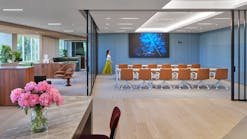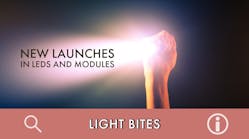Light Bites: What's happening in LEDs and lighting – July 12, 2022
This week, LEDs Magazine has short takes on market transformation programs from the U.S. Department of Energy (DOE) and the DesignLights Consortium (DLC), plus an update from the automotive-centric ISELED Alliance, as well as a lighting education opportunity from Mount Sinai Icahn School of Medicine's Light and Health Research Center.
L-Prize launches Prototype Phase
The DOE and its Building Technologies Office recently opened the next phase of the revamped L-Prize competition. The DOE American-Made Challenge program, as LEDs has previously reported, was redesigned with new targets for improved energy efficacy, light quality, connectivity, and product life cycle requirements to advance solid-state lighting beyond currently available products for commercial lighting.
“The L-Prize is primed to unlock the full potential of LED technology — to combine high efficiency with exceptional lighting quality, data-driven control, and sustainable design and construction in a winning product that will redefine the future of lighting,” said Carolyn Snyder, Deputy Assistant Secretary for Energy Efficiency.
Pacific Northwest National Laboratory (PNNL) lighting research Kate Hickcox, who helped to design the latest iteration of the L-Prize competition, recently outlined the features that earned four design teams $20,000 each in the Concept Phase. In the Prototype Phase, entrants can participate in a luminaire development track or a connected systems track. They may also prepare to team with other L-Prize participants for the Manufacturing and Installation Phase coming next year. Prototype Phase entrants are encouraged to seek solutions beyond current price points, standard form factors, and conventional materials to achieve groundbreaking designs that help to stimulate American manufacturing opportunities.
Visit the L-Prize website for more information on the Prototype Phase and to register for informational webinars on competition requirements and opportunities for teaming and prototype development.
DesignLights Consortium moves forward with SSL v5.1
In early July, the DLC announced that it has completed a transition to version 5.1 of its Solid-State Lighting (SSL) Technical Requirements. The policy required delisting of any products that do not meet v5.1 requirements from the Qualified Products List (QPL).
The v5.1 requirements indicate that listed products must report on integrated controls; data must include color and glare attributes based on light distribution for quality of light; and almost all products are now dimmable on the QPL. These changes are intended to highlight and promote energy savings beyond the switch to LED luminaires. More than 200 energy-efficiency incentive programs rely upon the QPL to enable users to identify and select qualifying products for rebates and cost savings.
“The DLC’s most recent SSL policy update promotes products that maximize energy savings and user benefits by requiring products on the QPL to feature advances in lighting quality and functionality,” DLC executive director and CEO Christina Halfpenny said. “Now fully implemented, V5.1 addresses efficacy and quality of light factors that are critical to creating solutions for a better future with better lighting.”
Visit the DLC website for particulars on the new requirements.
ISELED Alliance expands roster
The ISELED Alliance, an open industry association focused on developing an ecosystem for automotive lighting technology, has welcomed three new members:
- Optoelectronics supplier Hongbright
- Automotive electronics provider Intron Technology
- Sensors, electronics, and test equipment developer Polycontact
The alliance has racked up 42 member companies since its founding in 2016 by fabless semiconductor manufacturer Inova Semiconductors. Alliance members include lighting manufacturers, electronics developers, semiconductor and LED manufacturers, and specialty lighting designers working to streamline connectivity and color design, reduce system costs, and provide advanced functionalities for automotive and transportation lighting.
"The broad spectrum of alliance members from a wide range of industry segments gives the ISELED technology ever greater momentum," said Robert Kraus, CEO of Inova Semiconductors and Chairman of the ISELED Alliance. "The great success and rapid global acceptance of ISELED is largely due to the successful work of the Alliance."
Lighting practitioners lend educational expertise
The Light and Health Research Center (LHRC) at Mount Sinai is offering a 10-week lighting design program for professionals who are looking to begin or improve their lighting design practice. Professionals in interior design, building and construction, architecture, architectural engineering, lighting sales, and others may find the curriculum useful. The 10-week course will be held online with a mix of live, interactive remote sessions and supplemental reading, group activities, and a final design project presentation. Led by LHRC researcher and instructor Jennifer Brons, the course will feature additional instructors from the LHRC faculty and design firms Lam Partners and Renfro Design Group.
Participants will learn how to initiate the lighting design process, establish project objectives and criteria for application-appropriate lighting, evaluate space requirements, discover and apply design best practices and standards, create renderings and documentation, and more.
The LHRC lighting design course will run from Sept. 8 to Nov. 10, 2022. Upon completion, participants will receive a certificate from the LHRC. Learn more and register on the LHRC website.
CARRIE MEADOWS is managing editor of LEDs Magazine, with 20 years’ experience in business-to-business publishing across technology markets including solid-state technology manufacturing, fiberoptic communications, machine vision, lasers and photonics, and LEDs and lighting.
For up-to-the-minute LED and SSL updates, follow us on Twitter. You’ll find curated content and commentary, as well as information on industry events, webcasts, and surveys on our LinkedIn page and our Facebook page.

Carrie Meadows | Editor-in-Chief, LEDs Magazine
Carrie Meadows has more than 20 years of experience in the publishing and media industry. She worked with the PennWell Technology Group for more than 17 years, having been part of the editorial staff at Solid State Technology, Microlithography World, Lightwave, Portable Design, CleanRooms, Laser Focus World, and Vision Systems Design before the group was acquired by current parent company Endeavor Business Media.
Meadows has received finalist recognition for LEDs Magazine in the FOLIO Eddie Awards, and has volunteered as a judge on several B2B editorial awards committees. She received a BA in English literature from Saint Anselm College, and earned thesis honors in the college's Geisel Library. Without the patience to sit down and write a book of her own, she has gladly undertaken the role of editor for the writings of friends and family.
Meadows enjoys living in the beautiful but sometimes unpredictable four seasons of the New England region, volunteering with an animal shelter, reading (of course), and walking with friends and extended "dog family" in her spare time.







